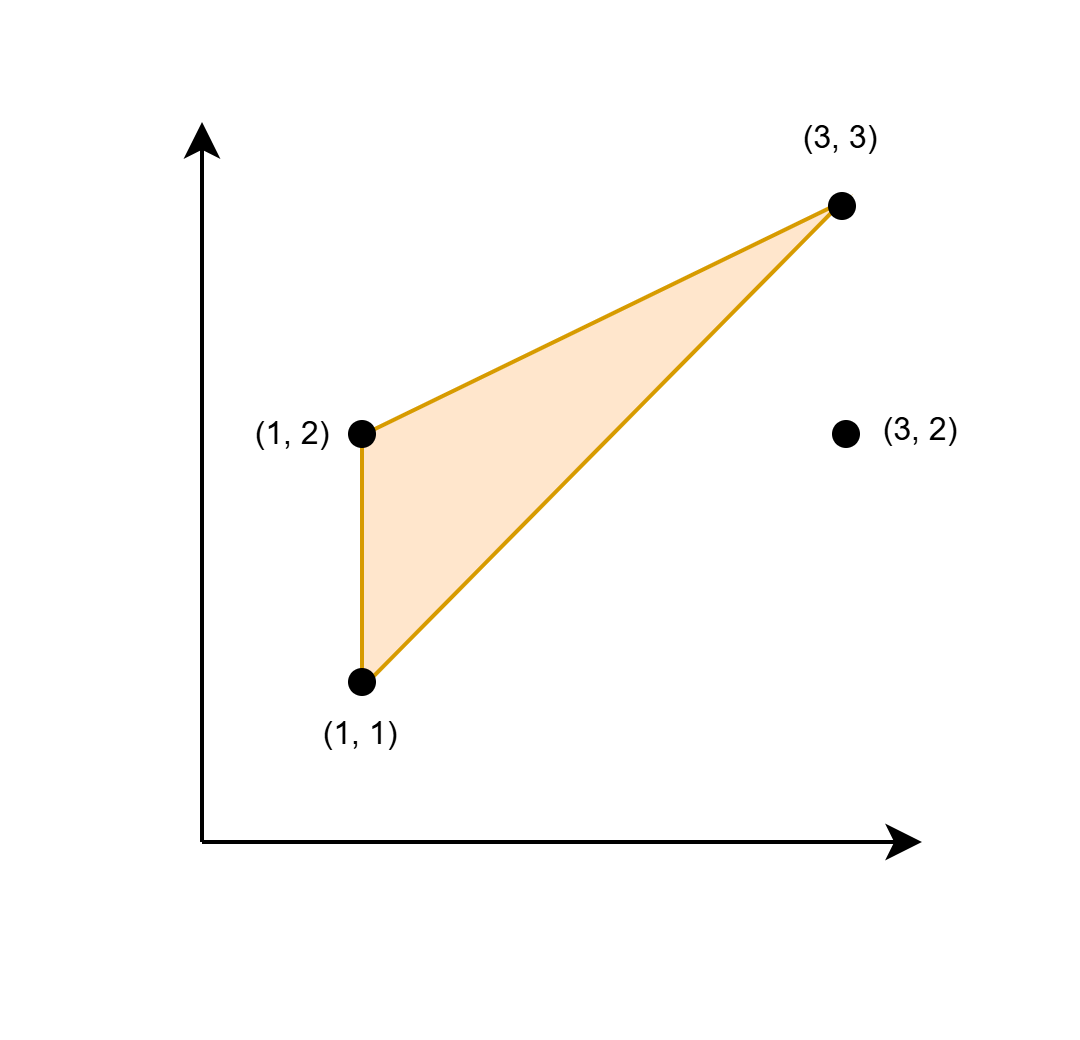LeetCode in Kotlin
3588. Find Maximum Area of a Triangle
Medium
You are given a 2D array coords of size n x 2, representing the coordinates of n points in an infinite Cartesian plane.
Find twice the maximum area of a triangle with its corners at any three elements from coords, such that at least one side of this triangle is parallel to the x-axis or y-axis. Formally, if the maximum area of such a triangle is A, return 2 * A.
If no such triangle exists, return -1.
Note that a triangle cannot have zero area.
Example 1:
Input: coords = [[1,1],[1,2],[3,2],[3,3]]
Output: 2
Explanation:

The triangle shown in the image has a base 1 and height 2. Hence its area is 1/2 * base * height = 1.
Example 2:
Input: coords = [[1,1],[2,2],[3,3]]
Output: -1
Explanation:
The only possible triangle has corners (1, 1), (2, 2), and (3, 3). None of its sides are parallel to the x-axis or the y-axis.
Constraints:
1 <= n == coords.length <= 1051 <= coords[i][0], coords[i][1] <= 106- All
coords[i]are unique.
Solution
import java.util.TreeSet
import kotlin.math.abs
import kotlin.math.max
class Solution {
fun maxArea(coords: Array<IntArray>): Long {
val xMap: MutableMap<Int, TreeSet<Int>> = HashMap<Int, TreeSet<Int>>()
val yMap: MutableMap<Int, TreeSet<Int>> = HashMap<Int, TreeSet<Int>>()
val allX = TreeSet<Int>()
val allY = TreeSet<Int>()
for (coord in coords) {
val x = coord[0]
val y = coord[1]
xMap.computeIfAbsent(x) { _: Int -> TreeSet<Int>() }.add(y)
yMap.computeIfAbsent(y) { _: Int -> TreeSet<Int>() }.add(x)
allX.add(x)
allY.add(y)
}
var ans = Long.Companion.MIN_VALUE
for (entry in xMap.entries) {
val x: Int = entry.key
val ySet: TreeSet<Int> = entry.value
if (ySet.size < 2) {
continue
}
val minY: Int = ySet.first()!!
val maxY: Int = ySet.last()!!
val base = maxY - minY
val minX: Int = allX.first()!!
val maxX: Int = allX.last()!!
if (minX != x) {
ans = max(ans, abs(x - minX).toLong() * base)
}
if (maxX != x) {
ans = max(ans, abs(x - maxX).toLong() * base)
}
}
for (entry in yMap.entries) {
val y: Int = entry.key
val xSet: TreeSet<Int> = entry.value
if (xSet.size < 2) {
continue
}
val minX: Int = xSet.first()!!
val maxX: Int = xSet.last()!!
val base = maxX - minX
val minY: Int = allY.first()!!
val maxY: Int = allY.last()!!
if (minY != y) {
ans = max(ans, abs(y - minY).toLong() * base)
}
if (maxY != y) {
ans = max(ans, abs(y - maxY).toLong() * base)
}
}
return if (ans == Long.Companion.MIN_VALUE) -1 else ans
}
}

